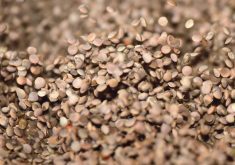Southern Alberta’s sugar beet industry is taking a wait-and-see approach following a U.S. District Court ruling requiring U.S. growers to uproot all their genetically modified (GM) Roundup Ready sugar beet seedlings.
Andrew Llewelyn-Jones, agricultural superintendent for Lantic Sugar, said southern Alberta farmers planted about 90 per cent of the 2009 crop and all of the 2010 crop with Roundup-ready seed. Southern Alberta farmers grew about 30,000 acres in 2010 and about 10,000 acres of beets are grown in Ontario and processed in Michigan.
The Canadian Biotechnology Action Network (CBAN) hailed the court decision as “the first court-ordered destruction of a GE crop in the U.S.” The decision follows a challenge from farmer and environmental groups based on the risks of contamination.
Read Also

‘Millions will die’: Foodgrains Bank faces $2.7B federal funding threat
Foodgrains Bank warns $2.7B aid cut triggers a humanitarian crisis, risking global hunger relief and 40 per cent of its funding.
Llewelyn-Jones said he can’t comment on issues in the U.S., and Lantic will await court appeals and the USDA environmental study before deciding on a plan of action.
CBAN , in a letter to Lantic CEO Edward Makin, asks that the company phase out GE sugar beets. Lantic Inc. is the only Canadian sugar company that processes GE sugar beet.
Llewelyn-Jones said the Alberta industry will continue to watch to situation evolve in the U.S. He said the GE beets grown in southern Alberta have been a “distinct advantage” to growers and industry. “We will base the 2011 crop decision on what transpires in the U.S.,” he said. “We will go forward accordingly. We want to do what is best for our growers.”














